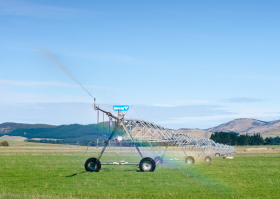Evaluating Instensification Trajectories in the Context of Climate Change
Principal Investigator: Dr Chris Rosin
Team: Prof Henrik Moller, Jon Manhire (The Agribusiness Group)
Project Summary
 The Evaluating Intensification Trajectories in the Context of Climate Change project develops a concrete set of recommendations for promoting appropriate adoption of agricultural intensification practices in the meat and dairy sectors while pursuing mitigation of and adaptation to climate change.
The Evaluating Intensification Trajectories in the Context of Climate Change project develops a concrete set of recommendations for promoting appropriate adoption of agricultural intensification practices in the meat and dairy sectors while pursuing mitigation of and adaptation to climate change.
These recommendations target the promotion of more resilient farm systems and greater capacity in the meat and dairy sectors to benefit from the opportunities associated with climate policy.
The project's research outcomes include identifying misconceptions about the implications of climate change for agricultural intensification as a management strategy; gaining a better understanding of the attraction of pathways to agricultural intensification; and investigating the impacts of intensification on the capacity to respond to climate change and benefit from climate policy.
These outcomes contribute directly to the SLMACC Research programme goals by providing necessary information for communities and sectors to adapt to a changing climate, helping to maintain flexibility of land use and identifying potential opportunities and risks related to climate change mitigation and adaption policies.
The potential benefits to New Zealand include the development of more resilient farming systems in the context of climate change, the increased competitive ability of agriculture value chains through the identification of appropriate intensification pathways and greater capacity to promote sustainable farming practice.
Project Update
May, 2014: A series of workshops on potential policy mechanisms for New Zealand pastoral farming systems have provided valuable feedback for the Agricultural Intensification and Climate Change project.
The workshops, organised by the Centre's Chris Rosin and Henrik Moller in collaboration with The Agribusiness Group and AERU, Lincoln University (with contributions from Fulbright Graduate student Madeline Hall), were held in Hamilton, Christchurch and Wellington and attracted a range of people, including New Zealand-based agriculture and research organisations, policy makers and farmers.
The sessions began by exploring and defining the concepts of intensification, resilience and climate change. Participants were then asked to rank potential policy options and work through how each pathway might go forward.
There was a general consensus that the focal pathways interact and overlap and that all are currently 'active' in the pastoral sector in some form. In many cases, the potential synergies between pathways were identified, which suggests that there is a need to assess these as parallel or intertwined rather than discrete pathways.
The team is now working toward policy recommendations, in the form of a report, for the Ministry of Primary Industries, which will promote the adoption of appropriate agricultural intensification practices in the meat and dairy sectors while pursuing mitigation of, and adaptation to, climate change.
Project overview
The Evaluating Intensification Trajectories in the Context of Climate Change project has the potential to inform discussions in the domestic and international literature regarding both the relative benefits and costs of agricultural intensification and the implications of climate change for intensification strategies. It will build on the strong research capabilities and infrastructure of the ARGOS project and the Lincoln University LTEM.
Two points of difference with existing research provide the basis for analytical insight: a unique empirical grounding in a broader set of real world responses for understanding climate change and intensification pathways; and a transdisciplinary approach that facilitates a more comprehensive understanding of the implications of climate change and agricultural intensification, drawing insight from social, ecological and economic perspectives.
The new knowledge of climate change as a factor in intensification trajectories in NZ farming will better position the meat and dairy sectors to avoid risks associated with the impacts of intensification while simultaneously identifying opportunities for market advantages based on verifiable benefits of specific types of intensification for environmental, economic and social outcomes.
The research team includes a strong core of existing capability and knowledge based within the ARGOS group of researchers. This transdisciplinary research team brings a proven track record of providing outcomes that are recognised internationally and contribute to the benefit of NZ. The key research partners are the AgriBusiness Group, Lincoln University, University of Otago, Te Runanga o Ngai Tahu and LandCare Research, Ltd.
Well-established and productive relationships with Fonterra, Beef and Lamb, a meat processing company, and MPI provide means for the implementation of policy recommendations based on project findings. ARGOS also maintains a Sheep-Beef and Dairy field officer to disseminate relevant research findings to farmers.
While few of the sheep-beef or dairy farms participating in the ARGOS project are Māori owned, the project's relationship with Ngai Tahu provides an avenue for incorporating findings within Māori research and innovation.
Funder: Ministry for Primary Industries, Sustainable Land Management and Climate Change Fund
Total contract value: $541,841.94
Term: Two years
End users: ARGOS, NZ Farmers, MAEF- SLMACC, Sheep/Beef and Kiwifruit Industries